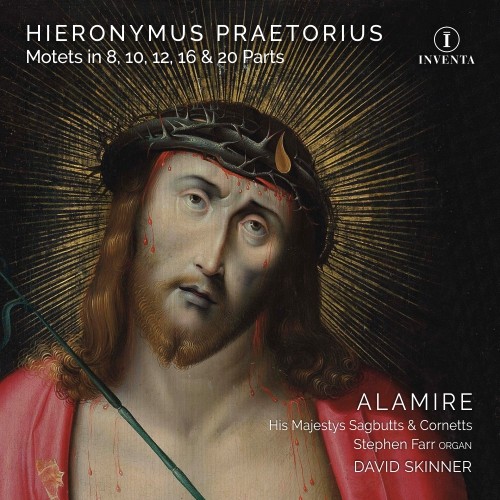ALAMIRE, His Majestys Sagbutts & Cornetts, Stephen Farr organ, David Skinner
100:25 (2 CDs in a single case)
Inventa Records (Resonus Limited) INV001
The music on this disc unfolded exactly as I had anticipated it would: mainly homophonic, predominantly Gabrielian, with some cute quirks of harmony. For this reviewer, one of the few miscalculations that Stile Antico have made in the course of their recordings is on A Wondrous Mystery: Renaissance Choral Music for Christmas (Harmonia Mundi HMU 807575) where they intersperse the movements of Jacob Clement’s Missa Pastores quidnam vidistis with later German music: the teutonic matter of the latter is entirely the wrong flavour to mingle courses with the refined and piquant Franco-Flemish helpings of Clement (note: please can we dispense with the cumbersome and no longer hilarious moniker Jacobus Clemens non Papa?). The current recording provides a banquet of such Teutonic matter with 16 pieces, including ten motets for from eight to 20 parts, by the Hamburg composer Hieronymus Praetorius (1560-1629), many of them seasoned with historic brass. For variety, there is his complete Missa summum for (mainly) organ with chanted plainsong, two sequentiae similarly for organ and voices, and a couple of motets played by brass alone. For all their differing vocal resources, the motets began to sound much of a muchness, and in fairness to David Skinner, he shuffles the pack to some extent, with usually no more than two similar works adjacent. Nevertheless, not everyone who relishes barnstorming motets full of voices and brass might be enthusiastic about the interspersed movements of the Missa summum with its long passages played on the historic organ at Roskilde. This is performed sensitively by Stephen Farr, but even he cannot make a case for Praetorius’s uninteresting writing for the organ here in the Mass and in the sequentiae. I take respectful issue with David Skinner’s description of this Praetorius (no relation of his contemporary Michael) as a master polyphonist. This reviewer was left desperate for some counterpoint amidst the onslaught of homophony, apart from some passages in the two motets a8 entrusted to the historic brass. One of Praetorius’s motets – perhaps the opening Dixit Dominus a12 – would stand up well on a disc of music varied by genre, period or locality. Together they become monotonous, and the music chosen to provide some variety within this disc is itself undistinguished. The performances are of course excellent, although perhaps inevitably, given the material, there is a residual impression of some shoutiness in the wake of the polychoral motets. Exultate iusti a16 brings the proceedings to a sonorous conclusion, but perhaps the finest work on this pair of discs is the dramatic Levavi oculos meas a10. It has a structural momentum not apparent in the other motets, which feel more sectional, and this momentum builds to an electrifying climax, with harmonic sparks flying.
Richard Turbet
Click here to visit the record company’s website.
